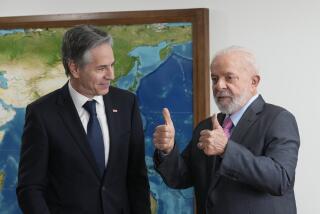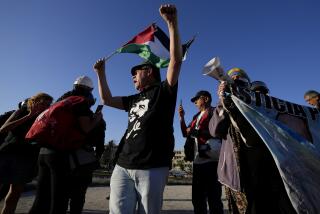Brazil, at Time of Crisis, Begins Work on New Charter
- Share via
RIO DE JANEIRO — Brazil’s National Congress on Wednesday installed nine committees that will draft a new constitution aimed at returning the country to full democracy.
The committees begin their work at a time of economic crisis and political uncertainty in Brazil, which was governed by the armed forces from 1964 to 1985.
This week marks the anniversary of the military coup that forced President Joao Goulart to flee the country on April 2, 1964. Goulart, a left-leaning populist, died in neighboring Argentina in 1976.
‘Economic Dictatorship’
Some commentators have compared Brazil’s current troubles to the economic and political turmoil under Goulart.
Commenting on the current situation, high-ranking military officials have expressed their support for the democratic process. But retired Gen. Joao Figueiredo, the last military president, criticized the transitional government, referring to it as an “economic dictatorship.”
Figueiredo turned power over to civilian President Jose Sarney two years ago after a gradual liberalization, or “opening,” process.
“I gave that opening, which I thought would lead to a democracy, and it led to a thing that--I don’t know what it is,” Figueiredo told reporters.
Which Is Worse?
“They used to talk about dictatorship,” he said. “I ask: Which is the biggest dictatorship, mine or this economic dictatorship that is there?”
Figueiredo spoke to reporters Tuesday in Rio de Janeiro at a Roman Catholic Mass, attended by retired military officers, commemorating the 1964 coup.
In Sao Paulo, air force Minister Otavio Moreira Lima told reporters that the armed forces have no intention of interfering in the democratic process.
“We must march forward, toward full democracy,” he said.
Gen. Ivan Linhares, the army’s southeastern regional commander, said the armed forces are the “guarantors of the process of perfecting democracy in the country.”
New Charter by Year’s End
A military “order of the day” read to troops around the country said the goal of the 1964 coup was “institutional reconstruction and democratic revitalization.” The statement said the new constitution should be “the basis for constructive and realistic resolution of the problems that afflict us, the foundation of a new institutional and political edifice.” The constitution will be drafted by the two houses of Congress, acting together as a constituent assembly. The new charter is scheduled to be finished by the end of the year.
Among critical issues to be dealt with in the constitution are the length of President Sarney’s term and the legal powers of the armed forces.
The current constitution, passed under military rule, sets the presidential term at six years and gives the military wide policy-making power in matters deemed important to national security.
The Congress, elected by popular vote in November, is dominated by Sarney’s Brazilian Democratic Movement Party and its ally, the Popular Liberal Front.
The current economic crisis, and competition over leadership positions in the constituent assembly, have opened deep divisions in the alliance. Some of its members have warned recently that the alliance may break up, and others have predicted that the Democratic Movement Party will abandon Sarney. Sarney, chosen for the vice presidency by an electoral college, assumed the presidency in April, 1985, when a fatal illness prevented President-elect Tancredo Neves from taking office.
Double-Digit Inflation
A system of price freezes imposed by Sarney broke down late last year, and inflation has surged to double-digit monthly figures.
In February, Sarney announced that Brazil was unable to meet obligations on its $109-billion foreign debt and suspended interest payments to foreign banks. The Democratic Movement Party issued a statement this week supporting the debt moratorium. But some of the party’s congressmen have joined opposition politicians in a campaign for a constitutional provision that would end his term early with direct presidential elections in 1988.
More to Read
Sign up for Essential California
The most important California stories and recommendations in your inbox every morning.
You may occasionally receive promotional content from the Los Angeles Times.













